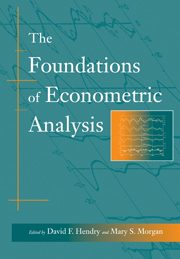Book contents
- Frontmatter
- Contents
- Preface
- Acknowledgements
- Introduction
- Bibliography
- I The Emerging Role of Econometrics in Economics
- II Early Time-Series Analysis
- III Applied Econometrics and the Identification Problem
- 14 The Elasticity of the Demand for Wheat (Economic Journal, vol. 24, 1914, pp. 212–17)
- 15 Economic Cycles – Their Law and Cause (Macmillan, New York, 1914, pp. 68–80)
- 16 Review of Moore, ‘Economic Cycles’ (Quarterly Journal of Economics, vol. 29, 1915, pp. 631–41 (cut))
- 17 Variation of Supply and Demand Curves: Influences on Prices (Etudes sur la Formation et le Mouvement des Prix, Paris, 1913, pp. 56–62)
- 18 A Moving Equilibrium of Demand and Supply (Quarterly Journal of Economics, vol. 39, 1925, pp. 359–60, 364–71)
- 19 Review of Schultz, ‘Statistical Laws of Demand and Supply’ (Journal of the American Statistical Association, vol. 24, 1929, pp. 207–15)
- 20 Determination and Interpretation of Supply Curves: An Example [Bestimmung und Deutung von Angebotskurven. Ein Beispiel] (Zeitschrift fur Nationalokonomie, vol. 1, 1930, pp. 669–79)
- IV The Evolution of Statistical Thinking in Econometrics
- V Dynamic Models
- VI The Tinbergen Debate
- VII Structure and Simultaneity
- VIII The Probabilistic Revolution
- IX Exogeneity
- Index
15 - Economic Cycles – Their Law and Cause (Macmillan, New York, 1914, pp. 68–80)
Published online by Cambridge University Press: 05 June 2012
- Frontmatter
- Contents
- Preface
- Acknowledgements
- Introduction
- Bibliography
- I The Emerging Role of Econometrics in Economics
- II Early Time-Series Analysis
- III Applied Econometrics and the Identification Problem
- 14 The Elasticity of the Demand for Wheat (Economic Journal, vol. 24, 1914, pp. 212–17)
- 15 Economic Cycles – Their Law and Cause (Macmillan, New York, 1914, pp. 68–80)
- 16 Review of Moore, ‘Economic Cycles’ (Quarterly Journal of Economics, vol. 29, 1915, pp. 631–41 (cut))
- 17 Variation of Supply and Demand Curves: Influences on Prices (Etudes sur la Formation et le Mouvement des Prix, Paris, 1913, pp. 56–62)
- 18 A Moving Equilibrium of Demand and Supply (Quarterly Journal of Economics, vol. 39, 1925, pp. 359–60, 364–71)
- 19 Review of Schultz, ‘Statistical Laws of Demand and Supply’ (Journal of the American Statistical Association, vol. 24, 1929, pp. 207–15)
- 20 Determination and Interpretation of Supply Curves: An Example [Bestimmung und Deutung von Angebotskurven. Ein Beispiel] (Zeitschrift fur Nationalokonomie, vol. 1, 1930, pp. 669–79)
- IV The Evolution of Statistical Thinking in Econometrics
- V Dynamic Models
- VI The Tinbergen Debate
- VII Structure and Simultaneity
- VIII The Probabilistic Revolution
- IX Exogeneity
- Index
Summary
The chief difficulties in the computation of statistical laws of demand are due to changes that occur in the market during the period to which the statistics of prices and of quantities of commodities refer. In order that the statistical laws of demand shall have sufficient validity to serve as prediction formulae, the observations must be numerous; and in order to obtain the requisite number of observations, a considerable period must be covered. This usually means that, during the interval surveyed in the statistical series, important changes occur in the condition of the market. But in case of staple commodities, such as the agricultural products with which we shall have to deal, the effects of those changes in the condition of the market that obscure the relation between prices and amounts of commodity may be largely eliminated. As far as the law of demand is concerned, the principal dynamic effects that need to be considered are changes in the volume of the commodity that arise from the increasing population, and changes in the level of prices which are the combined result of causes specifically responsible for price cycles and of causes that produce a secular trend in prices. The effects of these two fundamental changes may be eliminated approximately by a single statistical device, namely, by deducing the law of demand from a generalized treatment of the elasticity of demand.
- Type
- Chapter
- Information
- The Foundations of Econometric Analysis , pp. 198 - 205Publisher: Cambridge University PressPrint publication year: 1995



